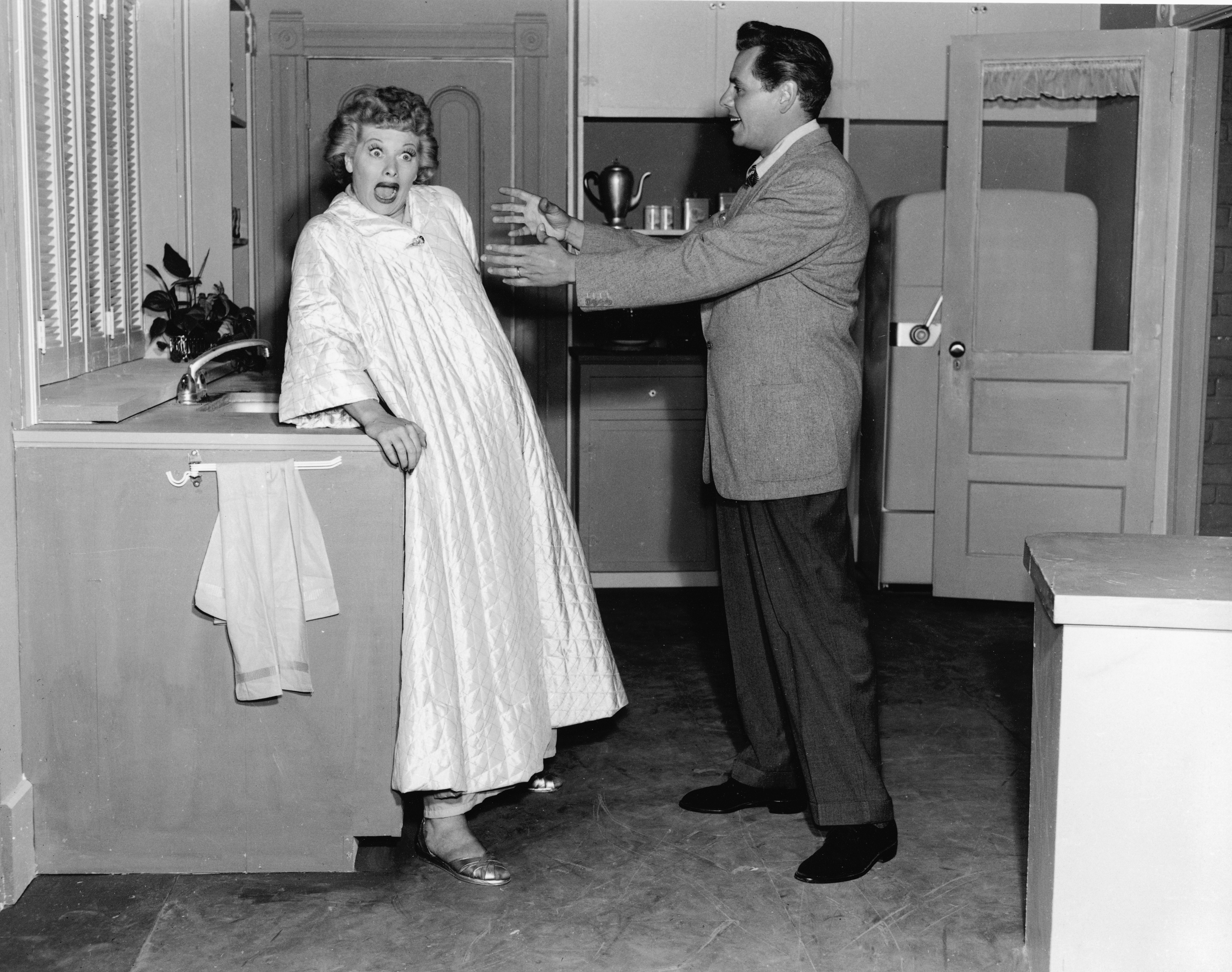I hate I Love Lucy
This isn't a comedy. It's a horror show.


It was when Ricky announced to a cringing Lucy that he'd keep their new couch in his office until she paid him for it with "her allowance" that I wondered whether I Love Lucy had somehow, in the decades since TV's defining sitcom first aired, switched genres from comedy to horror. How was this anxiety-laced scenario — which ends with a humiliated, badly-permed Lucy wearing an ugly dress she tried to make for herself to save money and adoring her husband for "forgiving" her — funny?
The situation in this episode — "Lucy Wants New Furniture" — is fairly typical fare: Lucille Ball's Lucy finds a good deal for a new couch and coffee table and buys them without telling Desi Arnaz's Ricky, who (when she raises the point) forbids it. It's too late, so Lucy hides the couch in the kitchen, blocking her own access to the room; she can only get there through Ethel's apartment. As with so many of Lucy's plans, this one is dumb: The old couch is gone and the kitchen table is now in the living room, so Ricky would be an idiot not to suspect something. He does. And he punishes her: first by making her run back and forth to the kitchen through Ethel's apartment to fetch him things as she waits on him at table, next by telling her that he knows the truth and she'll have to pay him back, and finally by forbidding her to get her hair done, suggesting she make a dress instead of buying one, and taking the new couch to his office until she repays him. Once she's failed to his satisfaction, he benevolently announces her "debt" to him canceled. All is well by the end of the episode — by which I mean that Lucy is so grateful to be forgiven by the man she's spent the episode waiting on, it almost makes your molars ache.
I Love Lucy has been hailed not just as one of the first great American sitcoms but also as a subversively progressive, proto-feminist text. I don't dispute that. I can understand perfectly how — for its time — it made space for a comedic genius like Ball (and normalized interracial marriage) in ways that felt revolutionary. The show is unquestionably at its best when the couples are uncoupled: There are long periods of sparkly perfection when Vivian Vance and Lucille Ball, comic powerhouses that they are, get onscreen together. There's a reason the grape-stomping and chocolate-wrapping scenes have become emblematic of the show's larger claims to greatness.
The Week
Escape your echo chamber. Get the facts behind the news, plus analysis from multiple perspectives.

Sign up for The Week's Free Newsletters
From our morning news briefing to a weekly Good News Newsletter, get the best of The Week delivered directly to your inbox.
From our morning news briefing to a weekly Good News Newsletter, get the best of The Week delivered directly to your inbox.
But for this viewer, the whole is sadder and more upsetting than its funniest parts.
I decided to finally watch I Love Lucy one evening this December; it seemed time to give this colossus of TV history its due. I'd watched The Burns and Allen Show some time ago with open-mouthed amazement, so I expected I Love Lucy to match and exceed it in every way.
But the beloved sitcom, with its history-making camera work and talented performers, elicited in me an alien, teeth-gritting discomfort. You don't typically expect a farce rife with domestic hijinks to have that strong an effect, or to leave you so resolutely joyless. It turns out I'm not alone: The repulsion I feel toward I Love Lucy is more widely shared than I thought. Many comedies are powered by anxiety, but I Love Lucy transforms anxiety into antic terror: Ball's manic desire for attention and fulfillment, coupled with her submissive need to please, is a recipe for soul-destroying unhappiness. Her frustration is constant, her mix of rebellion and fear is the product of conditions the show can't quite paper over. "It's like The Good Place, only the show doesn't know it's The Good Place," my partner said of their marriage as we watched Lucy and Ricky "reunite" time and time again.
Nothing could have prepared me for the episodes we sat down to watch. We chose the fifth disk of the second season more or less at random. An unlucky choice: It contains "Lucy is Matchmaker," in which Lucy is scolded for trying to set up a friend with a man, the aforementioned "Lucy Wants New Furniture," and "The Camping Trip," an episode in which Lucy fears her marriage has lost its spark and Ricky — who finds out this is troubling her — tries to punish her for wanting to spend more time with him.
A free daily email with the biggest news stories of the day – and the best features from TheWeek.com
The funny thing is that I Love Lucy wasn't always this punitive: Having watched quite a bit more, I know that the early episodes of the first season, before they'd quite figured it out, showed Lucy and Ricky joking with each other as equals. The pilot has a great little sequence where she nudges him while he's shaving, he pretends like he cut his ear off, and they escalate, building off each other's silliness in ways that feel amicable and companionate. The show would eventually (maybe even understandably) make their relationship basically adversarial. But the power dynamic they settle into is just too lopsided and cruel to be funny. Lucy gets dumber and more frantic as Ricky leans into a castigating smugness.
I don't mean physically. Granted, several episodes have Ricky threatening to spank his wife, who (on the show) routinely cries like a child and treats him like an irascible father. He grabs her by the ear in one episode, and another is dedicated to how black eyes sometimes do happen from walking into a door.
But this business about the "allowance" shocked me more than the routine joking about domestic violence. That's partly because it feels more underhanded; the worldview behind Ricky's finger-wagging pattern of "punishing" Lucy and later "rewarding" her by eliminating the punishment is all too familiar — it's a cheap manipulative tactic the president of the United States, among others, deploys on a regular basis. It also gestures at an entire model of marriage, the effects of which we know too well.
Let's take the allowance thing seriously, because it has ramifications into the present: I've seen many marriages that once operated under this abysmal premise (that a wife should do all the shopping for food and groceries with an "allowance" determined by her husband, who sternly finger-wags that she should be frugal and save whatever she can for "herself") collapse. And it's sad to see, not just because divorce is sad (though it can be), but because the resentments that accrue under an arrangement this dehumanizing generally explode. And the ensuing re-evaluation of what that whole shared life has been — or became, distorted by that relation — isn't pretty.
Neither, of course, is the way the actual Arnaz-Ball relationship ended. I Love Lucy gets floated as an early precursor to reality TV, what with Ball's pregnancy mapping perfectly onto Lucy's and the couple being married in real life. But we shouldn't forget that their real relationship was famously rocky: Envious of Ball's success, Arnaz routinely cheated on her. To me, I Love Lucy feels like watching a marriage collapse in real time. Nothing is less surprising than the fact that shortly after it ended, Lucille Ball — charging "extreme cruelty" — filed for divorce.
Lili Loofbourow is the culture critic at TheWeek.com. She's also a special correspondent for the Los Angeles Review of Books and an editor for Beyond Criticism, a Bloomsbury Academic series dedicated to formally experimental criticism. Her writing has appeared in a variety of venues including The Guardian, Salon, The New York Times Magazine, The New Republic, and Slate.
-
 Political cartoons for November 29
Political cartoons for November 29Cartoons Saturday's political cartoons include Kash Patel's travel perks, believing in Congress, and more
-
 Nigel Farage: was he a teenage racist?
Nigel Farage: was he a teenage racist?Talking Point Farage’s denials have been ‘slippery’, but should claims from Reform leader’s schooldays be on the news agenda?
-
 Pushing for peace: is Trump appeasing Moscow?
Pushing for peace: is Trump appeasing Moscow?In Depth European leaders succeeded in bringing themselves in from the cold and softening Moscow’s terms, but Kyiv still faces an unenviable choice
